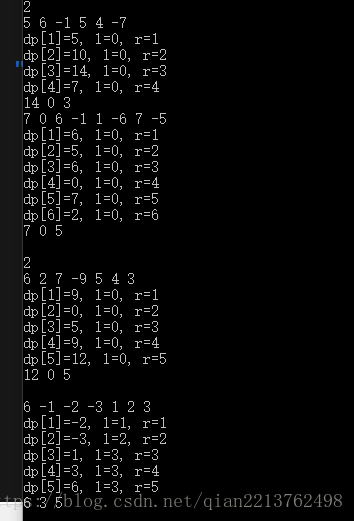【动态规划-最大连续子序列和】HDU 1003 Max Sum 最大连续子序列和的左右区间
http://acm.hdu.edu.cn/showproblem.php?pid=1003
Max Sum
Time Limit: 2000/1000 MS (Java/Others) Memory Limit: 65536/32768 K (Java/Others)
Total Submission(s): 294367 Accepted Submission(s): 69893
Problem Description
Given a sequence a[1],a[2],a[3]......a[n], your job is to calculate the max sum of a sub-sequence. For example, given (6,-1,5,4,-7), the max sum in this sequence is 6 + (-1) + 5 + 4 = 14.
Input
The first line of the input contains an integer T(1<=T<=20) which means the number of test cases. Then T lines follow, each line starts with a number N(1<=N<=100000), then N integers followed(all the integers are between -1000 and 1000).
Output
For each test case, you should output two lines. The first line is "Case #:", # means the number of the test case. The second line contains three integers, the Max Sum in the sequence, the start position of the sub-sequence, the end position of the sub-sequence. If there are more than one result, output the first one. Output a blank line between two cases.
Sample Input
2
5 6 -1 5 4 -7
7 0 6 -1 1 -6 7 -5Sample Output
Case 1:
14 1 4
Case 2:
7 1 6Author
Ignatius.L
Recommend
We have carefully selected several similar problems for you: 1176 1087 1069 1058 1159 
AC Code
#include
#include
#include
#include
using namespace std;
const int nmax=100000+10;
int a[nmax];
int dp[nmax];//必须以a[i]作为结尾的连续子序列的最大和
int l[nmax];//必须以a[i]作为结尾的连续子序列的左端点
int r[nmax];//必须以a[i]作为结尾的连续子序列的右端点
int main(int argc, char** argv) {
int t;
while(cin>>t){
for(int k=1;k<=t;k++){//t组测试数据
memset(a,0,sizeof(a));
memset(dp,0,sizeof(dp));
memset(l,0,sizeof(l));
memset(r,0,sizeof(r));
int n;
cin>>n;
for(int i=1;i<=n;i++){
cin>>a[i];
dp[i]=a[i];
}
l[1]=1;r[1]=1;
for(int i=2;i<=n;i++){
//dp[i]=max(dp[i],dp[i-1]+a[i]);
if(dp[i-1]+a[i]>=dp[i]){
dp[i]=dp[i-1]+a[i];
l[i]=l[i-1];//左端点不变,右移右端点
r[i]=i;
}
else{
l[i]=i;//新起一个数
r[i]=i;
}
//printf("dp[%d]=%d, l=%d, r=%d\n",i,dp[i],l[i],r[i]);
}
int ans=dp[1];
int pos=1;
for(int i=2;i<=n;i++){//<=
if(dp[i]>ans){
ans=dp[i];
pos=i;
}
}
cout<<"Case "<